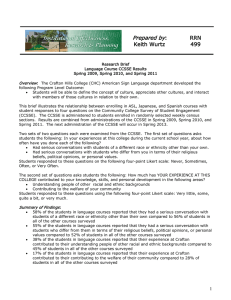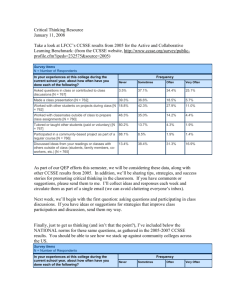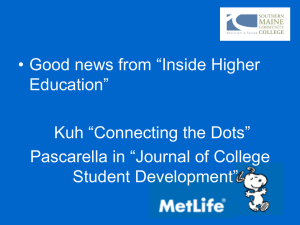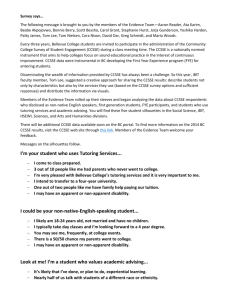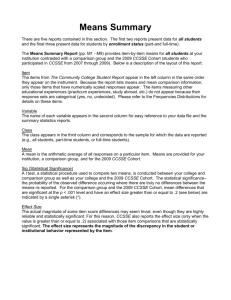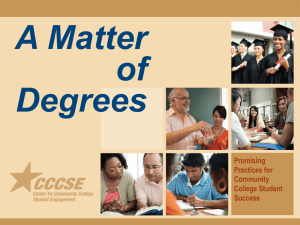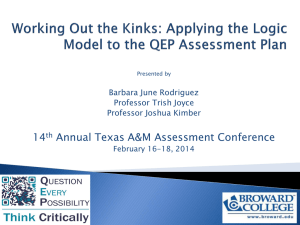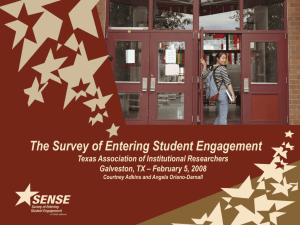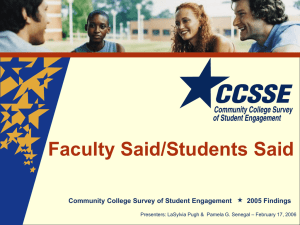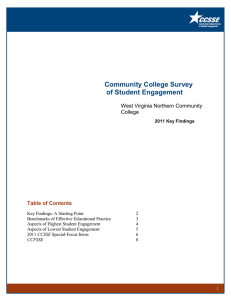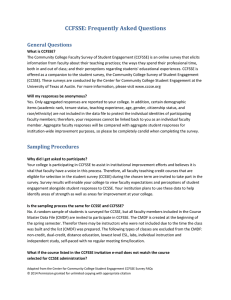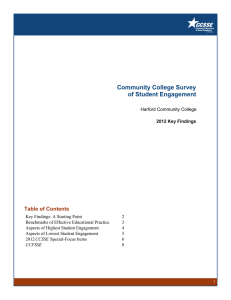CCSSE Conversations Presentation
advertisement
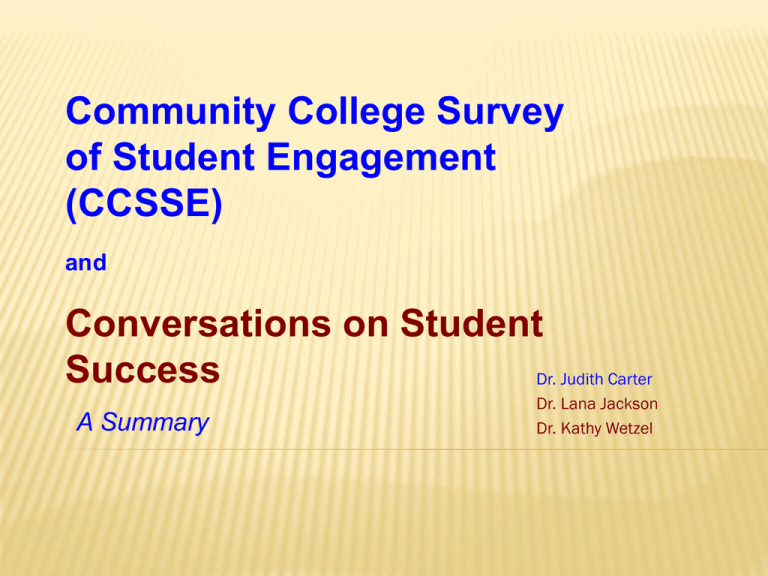
Community College Survey of Student Engagement (CCSSE) and Conversations on Student Success Dr. Judith Carter A Summary Dr. Lana Jackson Dr. Kathy Wetzel CCSSE and CCFSSE Studies The CCSSE team was charged with reviewing the student and faculty engagement surveys and preparing a report of observations and recommendations from the data. Dr. Judith Carter, Chair Heather Atchley Tyler Grisham Lynae Jacob Patsy Lemaster Aimee Martin Anthony Najar Judy Jackman Kara Larkan-Skinner Julie Mann Adam Moore Mark Usnick CCSSE and CCFSSE Studies The team looked at the five benchmarks the survey measures: active and collaborative learning, student effort, academic challenge, student-faculty interaction, and support for learners. CCSSE and CCFSSE Studies Positive Conclusions: Students are provided with the financial support needed to afford their education. Students frequently visit academic advising/planning. Students frequently access career counseling. Students frequently use skills labs (writing, math, etc.). Students are challenged by examinations to do their best work. CCSSE and CCFSSE Studies Primary Concerns: Students need to make class presentations. Students should work with other students on projects during class. Students should work on a paper or project that requires integrating ideas or information from various sources. CCSSE and CCFSSE Studies Recommendations to Administrators: Make student writing an institutional priority for the College. Maintain small class sizes to encourage an increase in all forms of communication, especially writing, in the classes. Develop an extended orientation for students as developed by the First-Year Experience Committee. Schedule the CCSSE and CCFSEE for every two or three years when new contracts for the surveys are made. CCFSSE (faculty) vs. CCSSE (students) Studies Differing Perceptions: Faculty perceive that students ask questions and contribute in class; students say that they are less engaged than the faculty perceive. Few faculty say that students are preparing two or more drafts of a paper or assignment prior to submission for grading; students say that they are completing two or more drafts prior to submission for grading. Almost all faculty believe their feedback (written or oral) is prompt; a majority of students disagree. CCSSE and CCFSSE Studies Recommendations to Division Chairs, Department Chairs, Program Directors, and Program Coordinators: Institute a lunch and learn workshop for students and faculty. Encourage faculty to educate students on different perceptions between faculty and students. Encourage faculty to learn assessment of communication in all forms. Emphasize Best Practices in teaching methodology and provide training and funding for faculty development. Conversations on Student Success The Conversations team will identify challenges and opportunities for improving student success at Amarillo College by examining institutional data and applying Best Practices found in research literature. Based on collected evidence and a series of conversations on student success, provide insights into the AC community and student success which may be used for long-term institutional planning. The team met nine times throughout the year to discuss AC data and Best Practices research. Conversations on Student Success Tyler Adams Becky Burton Brandi Clark Dr. Mary Dodson Charlotte Goebel Victoria Hughes Alexa Maples Bob Mathews Anthony Najar Hailey Robertson Joe Wyatt Dr. Lana Jackson Jennifer Bartlett Judy Carter (Speech) Cara Crowley Dr. Shawn Fouts Ann Hamblin Dr. Alan Kee Jan Martin Susan McClure Ernesto Olmos April Sessler Dr. Steven Weber Dr. Kathy Wetzel Conversations on Student Success The team participated in nine discussion forums: Completers (Graduation and Transfer) First-generation Students Critical Thinking Experiential Learning Technology Literacy Oral Presentations Information Literacy Employment/Career Focus Development Education Students/At-risk Students Each meeting culminated with a list of the top 3 challenges, as determined by large group consensus, for enhancing Student Success in the topic under discussion. Recommendations for Best Practices, as identified in the research literature, were identified in small group discussions and reported on the Meeting Notes. Conversations on Student Success The team hosted Secrets of our Success: A Student Conversation with 16 student participants representative of diverse demographic groups. The students engaged in small group discussions moderated by a Conversations team member. Question prompts were provided to encourage the participants to engage in discussions related to the following topics: Creating Student Success Life Challenges Classroom Experiences Advice to Peers Consensus Building The two teams (CCSSE & Conversations) met in May to identify the three main areas of concern for improving Student Success at Amarillo College. Using the CCSSE Report, Conversations Meeting Notes, and the Student Conversation Meeting Notes, the combined team concluded the top three areas of concern to be: Critical Thinking Student Engagement Under-preparedness Consensus Building: Critical Thinking Challenges: Deficit in Critical Thinking activities, projects. Deficit in key assignments (paper or project) that require integrating ideas or information from various sources. Low participation levels of students who ask questions or contribute in class. Opportunities: Collaborate on defining CT on an instructional level. Provide models for faculty incorporation of CT activities/projects into classroom (ex. video examples of master teacher). Train faculty on how to implement a rubric for CT assessment. Place student projects on the Web as examples of CT development. Note: Improving Critical Thinking skills is interrelated with providing experiential learning opportunities and improving the integration of ideas from various sources (ex. class/oral presentations, group projects). Consensus Building: Student Engagement Challenges: Deficit in student engagement with each other, with faculty, and with college as a whole. Disparity in perceived response time between students and faculty. Opportunities: Increase student engagement through the development of – sticky spaces, student success classes tailored to career clusters, and an expanded FYE program to include at-risk and 1st generation students. Modify the advising process – adviser should serve as facilitator for student, and, when appropriate, faculty should advise students. Control class sizes and faculty load assignments to allow more time for written assignments/class projects. Encourage relationship building opportunities through: learning communities, online communities, student clubs, etc. Encourage faculty/staff to focus on students. Do not cross-train with IT or business office responsibilities. Consensus Building: Under-preparedness Challenges: Students are under-prepared for college-level work. Students are unprepared for college culture. Deficit in technology literacy. Opportunities: Provide extended orientation for students in each division, covering time management, stress reduction, connection to a class, goals, organizational skills, transfer issues, etc. Build social support network through learning communities, clubs, sticky spaces, etc. Assess for and provide training in technology literacy. Provide 24/7 access to technological support and equipment. Encourage students to “complete” and “transfer”. Connect student with “real world” mentors. Employ latest proven techniques for enhancing student success in existing student services package, including activities that incorporate extended family into educational setting, early academic intervention practices, and career assessment/advising techniques. Next Steps Top three areas of concern will be presented to the President’s Cabinet for selection of a Quality Enhancement Plan (QEP) topic for SACS Re-affirmation of Accreditation. Identified findings/challenges and research-based Best Practices may be used in developing goals and strategies for the new Strategic Plan. The CCSSE Committee Report and Meeting Notes from all Conversations on Student Success may be found at: http://cis7.actx.edu/aclibrary/student_success
